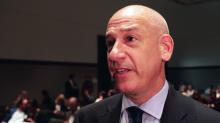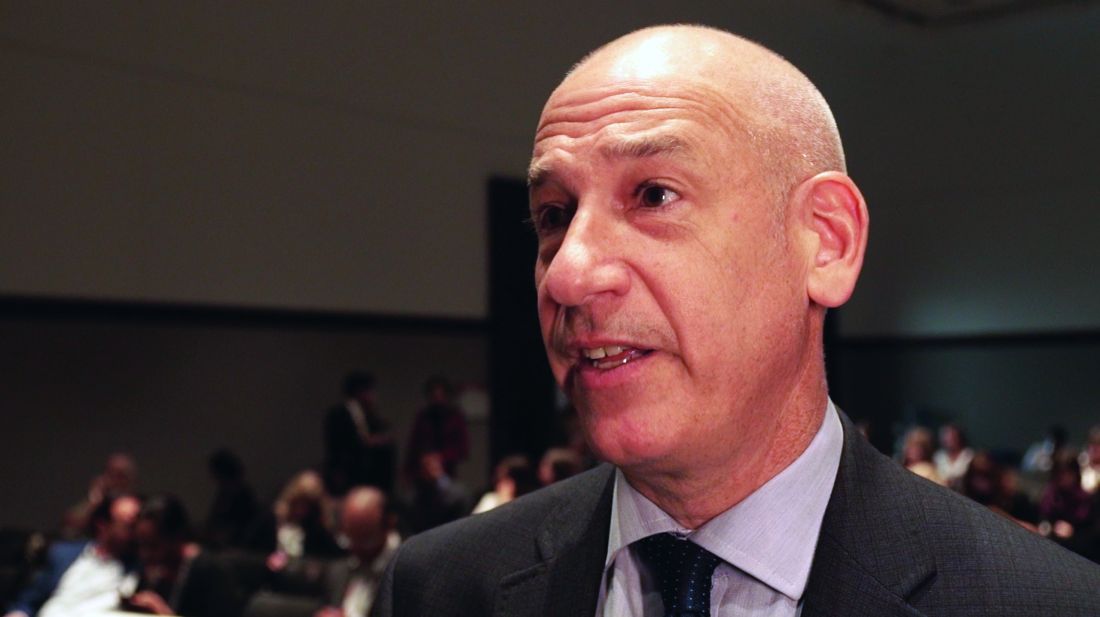User login
according to Joshua D. Safer, MD, executive director of the Mount Sinai Center for Transgender Medicine and Surgery, New York.
“It’s not that we have to be the experts on making diagnoses or other elements of transgender care, necessarily,” Dr. Safer said in an interview here at the annual scientific & clinical congress of the American Association of Clinical Endocrinologists.
In a meet-the-expert session at AACE, Dr. Safer talked about the “change in landscape” in transgender medical care that precipitated the Endocrine Society clinical practice guideline on endocrine treatment of gender-dysphoric/gender-incongruent individuals.
The new guidelines, published just this past fall, updated guidance published by the society back in 2009.
One big change for pediatrics in the new guidelines is the recognition that there may be “compelling reasons” to start cross-sex hormonal therapy prior to 16 years, the former age cut-off. Sixteen years is “very late if you’re thinking about it from a biological perspective,” said Dr. Safer, who was a coauthor of the new guidelines.
While there are only limited data on using gender-affirming hormones in younger adolescents, there are potential risks of waiting until age 16 years in some cases, according to the guidelines.
For example, an individual who reaches Tanner stage 2 at age 9-10 years might be at risk of bone health issues if puberty is suppressed for 6-7 years before initiating sex hormones. Other risks could include inappropriate height or emotional/social isolation if the adolescent has to wait until age 16 years for initiation of secondary sex characteristics. On the adult side, one of the biggest changes is removing the idea that a mental health professional is necessary to make the diagnosis. In truth, any knowledgeable clinician could make that diagnosis, according to Dr. Safer.
A transgender individual’s treatment team should include several providers, according to guidelines: a medical provider who is knowledgeable in transgender hormone therapy, a mental health provider who is knowledgeable in gender dysphoria/gender incongruence and transition-associated mental health concerns, plus a primary care provider who can provide care appropriate to transgender needs.
Nonbinary persons (that is, those not exclusively identifying as either male or female) might need some “special tailoring” of treatment within accepted safety guidelines, Dr. Safer noted. Endocrinologists should provide education regarding onset and time course of physical changes induced by sex hormones for transgender individuals undergoing treatment, the guidelines also recommend.
It’s very important for endocrinologists to be familiar with why the landscape has changed for transgender health care, Dr. Safer said at the meeting.
“It’s not that we’ve all decided to be more tolerant or something along those lines,” he said in the interview. “It’s that even those of us who have been very skeptical in the medical and scientific community have recognized that there is clearly a biological component to gender identity.”
according to Joshua D. Safer, MD, executive director of the Mount Sinai Center for Transgender Medicine and Surgery, New York.
“It’s not that we have to be the experts on making diagnoses or other elements of transgender care, necessarily,” Dr. Safer said in an interview here at the annual scientific & clinical congress of the American Association of Clinical Endocrinologists.
In a meet-the-expert session at AACE, Dr. Safer talked about the “change in landscape” in transgender medical care that precipitated the Endocrine Society clinical practice guideline on endocrine treatment of gender-dysphoric/gender-incongruent individuals.
The new guidelines, published just this past fall, updated guidance published by the society back in 2009.
One big change for pediatrics in the new guidelines is the recognition that there may be “compelling reasons” to start cross-sex hormonal therapy prior to 16 years, the former age cut-off. Sixteen years is “very late if you’re thinking about it from a biological perspective,” said Dr. Safer, who was a coauthor of the new guidelines.
While there are only limited data on using gender-affirming hormones in younger adolescents, there are potential risks of waiting until age 16 years in some cases, according to the guidelines.
For example, an individual who reaches Tanner stage 2 at age 9-10 years might be at risk of bone health issues if puberty is suppressed for 6-7 years before initiating sex hormones. Other risks could include inappropriate height or emotional/social isolation if the adolescent has to wait until age 16 years for initiation of secondary sex characteristics. On the adult side, one of the biggest changes is removing the idea that a mental health professional is necessary to make the diagnosis. In truth, any knowledgeable clinician could make that diagnosis, according to Dr. Safer.
A transgender individual’s treatment team should include several providers, according to guidelines: a medical provider who is knowledgeable in transgender hormone therapy, a mental health provider who is knowledgeable in gender dysphoria/gender incongruence and transition-associated mental health concerns, plus a primary care provider who can provide care appropriate to transgender needs.
Nonbinary persons (that is, those not exclusively identifying as either male or female) might need some “special tailoring” of treatment within accepted safety guidelines, Dr. Safer noted. Endocrinologists should provide education regarding onset and time course of physical changes induced by sex hormones for transgender individuals undergoing treatment, the guidelines also recommend.
It’s very important for endocrinologists to be familiar with why the landscape has changed for transgender health care, Dr. Safer said at the meeting.
“It’s not that we’ve all decided to be more tolerant or something along those lines,” he said in the interview. “It’s that even those of us who have been very skeptical in the medical and scientific community have recognized that there is clearly a biological component to gender identity.”
according to Joshua D. Safer, MD, executive director of the Mount Sinai Center for Transgender Medicine and Surgery, New York.
“It’s not that we have to be the experts on making diagnoses or other elements of transgender care, necessarily,” Dr. Safer said in an interview here at the annual scientific & clinical congress of the American Association of Clinical Endocrinologists.
In a meet-the-expert session at AACE, Dr. Safer talked about the “change in landscape” in transgender medical care that precipitated the Endocrine Society clinical practice guideline on endocrine treatment of gender-dysphoric/gender-incongruent individuals.
The new guidelines, published just this past fall, updated guidance published by the society back in 2009.
One big change for pediatrics in the new guidelines is the recognition that there may be “compelling reasons” to start cross-sex hormonal therapy prior to 16 years, the former age cut-off. Sixteen years is “very late if you’re thinking about it from a biological perspective,” said Dr. Safer, who was a coauthor of the new guidelines.
While there are only limited data on using gender-affirming hormones in younger adolescents, there are potential risks of waiting until age 16 years in some cases, according to the guidelines.
For example, an individual who reaches Tanner stage 2 at age 9-10 years might be at risk of bone health issues if puberty is suppressed for 6-7 years before initiating sex hormones. Other risks could include inappropriate height or emotional/social isolation if the adolescent has to wait until age 16 years for initiation of secondary sex characteristics. On the adult side, one of the biggest changes is removing the idea that a mental health professional is necessary to make the diagnosis. In truth, any knowledgeable clinician could make that diagnosis, according to Dr. Safer.
A transgender individual’s treatment team should include several providers, according to guidelines: a medical provider who is knowledgeable in transgender hormone therapy, a mental health provider who is knowledgeable in gender dysphoria/gender incongruence and transition-associated mental health concerns, plus a primary care provider who can provide care appropriate to transgender needs.
Nonbinary persons (that is, those not exclusively identifying as either male or female) might need some “special tailoring” of treatment within accepted safety guidelines, Dr. Safer noted. Endocrinologists should provide education regarding onset and time course of physical changes induced by sex hormones for transgender individuals undergoing treatment, the guidelines also recommend.
It’s very important for endocrinologists to be familiar with why the landscape has changed for transgender health care, Dr. Safer said at the meeting.
“It’s not that we’ve all decided to be more tolerant or something along those lines,” he said in the interview. “It’s that even those of us who have been very skeptical in the medical and scientific community have recognized that there is clearly a biological component to gender identity.”
REPORTING FROM AACE 2018

